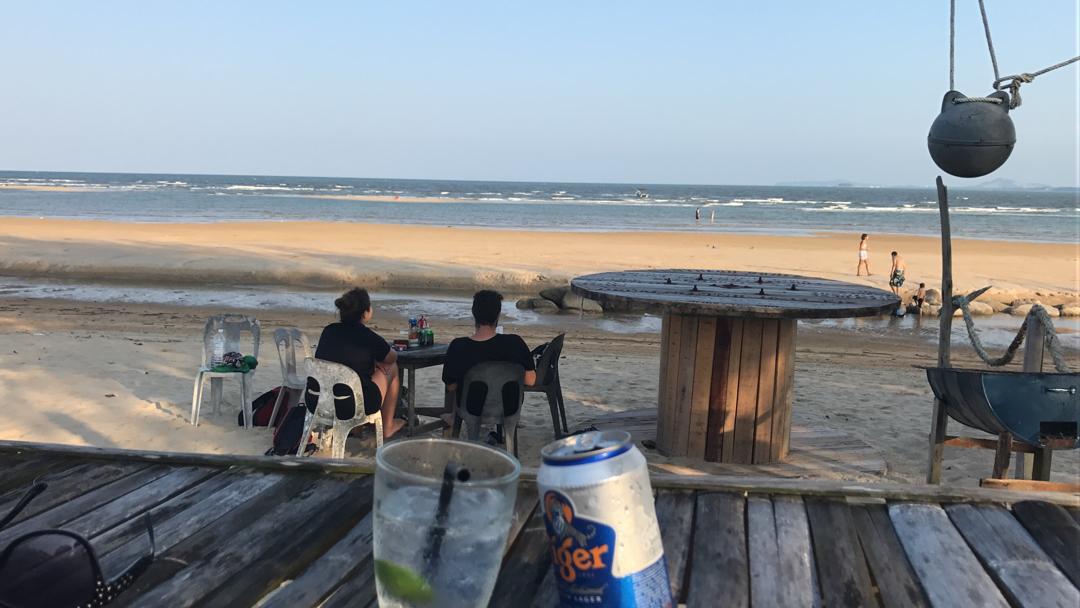Hi Money-makers,
In the final part of this 3-part series, I will share the steps I took to begin shifting my mindset from one of lack, scarcity, and guilt, to one where FI was a real possibility.
In Part 1 of this series, I shared how this paradigm shift happened for me, in the windy beaches of Cherating. In Part 2, I talked about identifying and beginning to overcome limiting beliefs that were holding me back from achieving FI.
So Step 1 of the FI journey is really that – identifying and overcoming limiting beliefs.
As I was beginning to overcome these beliefs, I was able to feel more confident and hungry and managed to negotiate higher salaries. I thought the solution must be earning more money, right? Well, that’s part of it. But as I advanced in my career and started earning more, I continued to have this same mindset, and still very little to show at the end of the month – which was frustrating! What was I not getting? I felt that no matter how much I earned, I was still caught in the same cycle.
It slowly dawned upon me that earning more money was only one part of the equation. I needed to have a plan.
Step 2: Set a clear goal
This is simple. Set an ambitious but achievable goal so you can start taking actions that are within your control to reach that goal.
At the early stages, I would set a goal to, say, hit RM5,000, or save enough for a trip, but I would never go beyond a certain ceiling before it went down again (read: excessive travel habits – although I’ve since learned to travel smart).
I realized very quickly that I needed a tangible goal to get me to not dip into my savings account the first chance I had. So I decided buying my first property was a worthy goal to set my sights towards.
Based on my income at the time, I decided I should be able to afford a monthly mortgage for a RM700,000 property – which meant that I had to save around 15% of that (10% deposit + 5% stamp duty, legal fees and other ancillary costs). That was a whopping RM105,000 in cash that I needed to have! Although it was a monumental task, I now had a target..
The only caveat I would issue here is to make sure your goal is related to an investment, instead of a consumption item. At the risk of stating the obvious, setting a goal to buy a car or to go on a nice holiday is not getting you any closer to FI.
Step 3: Start! The power of habits
Ok so you have a guiding star — now you just have to make your way towards it.
The aim at this stage is to develop a sense of control over your finances – which tends not to be the case when you are living paycheck-to-paycheck. At the time I set the goal of buying a property, I had not chanced upon the FI community yet. All I remember thinking was – I need to start investing so my money can grow. But with just a few thousand ringgit, what were my options?
Savings: Well, first off, start developing a habit of saving more. I tracked my expense using a money app, figured out some expenses I could cut, and the decided to try to cap my monthly expenses. So every month when my salary came in, I would transfer that capped amount into my expense account, and keep the rest in a separate savings account that I opened. Although I inevitably dipped into my savings account for travel and other larger expenses or emergencies, it reversed my thinking so that savings was the default, rather than spending.
Investments: Around the same time, a friend recommended unit trust as a good mid-long-term investment that could help grow my money for a downpayment for a property, so I decided to just dive right in. In hindsight, the returns have not been great after taking into account the fees I have been paying, it instilled a valuable habit of setting aside money monthly and automatizing my investments. Since it was directly debited from my account into my investment account, It was money I never saw and thus, money I never missed. I also signed up for a Private Retirement Scheme, which was also auto-debited from my account.
Unfortunately, after a while, I lost sight of my goal, and lost track of my plan. I decided that it was time for me to move out of my parents home into my own place. I found myself a lovely 1 bedroom rental in Bangsar. While the year I had there was really pure joy, it put a massive dent in my savings. I also took a really amazing (but expensive) trip to Latin America. By the end of the year, I felt almost like I was back at square one.
Enter Mr. Money.
Step 4: Study, experiment, repeat: Begin understanding the power of money
The one thing Mr. Money loves, is money. He loves reading and learning about finances, interest rates, the economy, investments. Although I initially found this terribly dull, after a while, some ideas begin to seep in. He started asking me about my investments, and I realized I knew very little about them. He was shocked that I was just “giving money to the bank” by keeping money in savings account instead of a fixed deposit. I never bothered to read about how much fees I was paying, what interests I was getting out of my investments.
He, on the other hand, has structured his savings and investments almost from Day 1, and is very clear about his path. He is also a minimalist. I always tell people in amusement about how, apart from work clothes, he only owns 4 polo T-shirts and 2 pairs of shorts, 2 jeans and 2 “party-shirts”. His home, which looks like an IKEA showroom, is pristine and tidy, with almost every item serving a purpose. He keeps his life simple, and I really love that about him. Watching him be intentional about his expenses and savings and reading the numerous articles he would send over, made me rethink my choices about what I own and what I purchase, and actually got me slowly (and very reluctantly) interested in money.
On a lazy Sunday, we were chilling at home when he told me about this movement picking up in United States called FIRE (Financial Independence, Retire Early), led by Mr. Money Mustache. We started reading up about him and watching some videos and were totally captivated! Here were a bunch of young Americans, living a simple lifestyle, saving and investing between 50% – 80% of their income over a few years, and managing to actually retire early! Many of them still work, but they don’t have to anymore. It was totally mind-blowing.
So that began the real process of learning for me. I obsessively read articles and listened to podcasts (my favourite is Choose FI, I highly recommend it!). I started hearing about how so many people from all walks of life have chosen this path, and have actually managed to achieve it by just being intentional about how they spend, earn and save.
The big “A-ha!” moment for me came when I realized why all those years ago, I never felt like I could set aside savings despite being able to earn more money. It was all about my expenses! As I earned more, I correspondingly increased my lifestyle and expenses. Although I would always look for a bargain (read how I got this habit from my dad here) and was never into big brands, I was also not really conscious about what I was buying, and whether I needed something in the first place.
I started by looking at all my expenses again, but this time, with the proverbial microscope. I started with my recurring expenses such as my mobile phone, car payments, insurance, internet. I reconsidered clothes, toiletries, gadgets or anything else that I didn’t need. I would always try to ask myself “Do I really need this?” before paying for something. I found that just stopping to ask yourself that question, helps in making smarter purchases. I also did a Marie Kondo, and cleaned out my wardrobe and all my possessions, and really just simplified my life.
I definitely don’t lead a frugal life, but just being more intentional about my expenses and understanding money and my investments better meant that I started making smarter choices, and were important building blocks to creating an FI mindset.
Step 5: Having good role models
Heard of the phrase “You are the average of the 5 people you spend time with”?
For me, that included Mr. Money and the good guys Brad and Jonathan from the Choose FI podcast that I listened to almost daily on the road when I was driving, cooking, or just doing laundry. That’s the beauty of podcasts and Youtube! You can surround yourself with all kinds of people these days – all from the comforts of your living room or your car. Listening to tips, stories and ideas for earning, investing and saving more just ingrained it in my daily thinking and choices.
I also started talking money to friends and family, which can often be seen as a bit of a taboo topic. I would ask them about investments they were making, how they felt about it, and tips of how to make smarter financial choices. I realized when I would start sharing, people are more open to it and actually welcome the opportunity to share advice and learn.
Step 6: The “Why”
Amidst all of this, I was acutely aware that I could fall off the FI bandwagon, so to speak, at any time. I still had many days of eating out unnecessarily and spending on other things without much thought. While home ownership was a worthy goal and helped in developing good financial habits, I was beginning to realize that it was not enough of a long-term motivation. Once I purchased a home, what then?
I realized that I didn’t really have a “why”. Why did I want to earn more money? What would I do with it? What was my motivation? For Mr. Money, financial independence was the security of knowing that he could at any time just leave his job and live a life he wanted, without thinking about whether he had enough. That was a solid long-term vision.
But sometimes this answer doesn’t come to easily either, and it didn’t for me. Sure, it would be nice to be able to take off anytime I wanted and travel the world, but I actually like working. I get so much fulfilment from it, and would be happy to continue to do so for years to come. At the same time, I realized that that’s not really a smart way of thinking, because my situation could change anytime. I may not be able to work, or may be made redundant, or may have a family and my priorities could totally change. Still, I felt like I needed a stronger “why”.
I was listening to a financial independence podcast one day, and the speaker, Grant Sabatier framed this in a different way that I think could help some people think about the “why”. Ask yourself, “What kind of life do I want to lead, and how will money help me get there?” I found that the answer come so much easier to me then because I had something to visualize.
I saw myself living in a beautiful cottage, surrounded by mountains and lakes and trees. Having my own vegetable garden, living sustainably and in connection with nature and people around me. Mr. Money and I having coffee in the garden, eating off our land, going for runs in the forest. Surrounded by family and close friends. Close enough to nature, but also to a city (Mr. Money is more of a city person). I still see myself working on interesting projects related to my field of social impact. Travelling to exotic parts of the world and perhaps even living in different locations for prolonged periods of time. Hahhhhh. Just writing this out makes me so happy.

But let’s be honest, this lifestyle is going to need some serious financial planning. It will require not just owning a property, but also having a very steady and substantial stream of passive income to be able to up and leave at any time, travel the world and take care of my health and that of my loved ones.
What’s beautiful about it is that this visualization exercise is that it is something everyone can do, and it can help you start developing those habits that will eventually help you start to lead the kind of life you want to lead. Like eating well, exercising, prioritizing relationships with friends and family, and understanding where your career fits in with everything. These are things I can start doing NOW, as I build up a plan for financial freedom that will hopefully allow me to be able to lead this life.
Ultimately, for me, the life has to come before money in the path to achieving financial independence. I don’t want to scrimp and save and struggle in the years leading up to FI, forgoing my health, important relationships and experiences for the sake of this dream, but when I get there, I realize that everyone hates me, I’m unhealthy and I have the spiritual depth of a stone.
So ask yourself – what is the life I want to lead, so your motivation to earn money has that positive energy behind it. More importantly, so you can start living your life today, in a way that helps you get there down the road.
BONUS Step 7: Increasing your income – the golden side-hustle
So this has been a recent revelation for me, and one that I would really encourage everyone to start thinking about. There’s a limit to how much you can cut your expenses, but there is no limit to how much you can earn.
You can save all you want (and it’s still important that you do), and keep your expenses low, but if you have a low income, it just will take you that much longer to get there.
Although my income had been steadily increasing over the past 5 years or so, I had not learnt to be conscious of my spending at the time. So the additional income didn’t really make a difference to me because I would spend it just as fast as I would make it. However since I started capping my expenses, actively saving and being conscious about spending, earning additional income was really a game-changer for me.
Last year, I decided to leave my full-time job, to take on a part-time job. Apart from the fact that the new position was a really exciting one, I did this for two other reasons: (i) the part-time gig paid me almost as much as my previous full-time job; and (ii) it also gave me an additional 2 days a week to take on other types of work. I also had the opportunity to work full-time for 4 months as a maternity cover. My income almost doubled over a 4 month period. My expenses however, didn’t change. Seeing that money just exponentially grow in my account had a surprising effect on me – I saw it was possible. Following that, I was determined to increase my income with the side hustle as much as I could. I’ve since started doing consultancy work with that additional two days, and that has really boosted my income, and consequently, my savings.
Even if you are in a full-time job now, but you feel like you have more to offer and would like to see how you can capitalize on your talents and hard work to earn more, I would strongly encourage you to start by just setting that intention first. Start thinking about what unique skills sets you have to offer and starting learning about the market. I will write a separate post about the details of how I developed the side hustle, the challenges of figuring out a charge out rate, and all that other fun stuff soon!
Where to now?
The famed philosopher Alan Watts had the best definition of success that I’ve ever heard. He says “Success, is the progressive realization of a worthy ideal”. I believe I have a worthy ideal; and that I am progressively realizing it. I think this means I am successful! YES!
So that’s the journey so far. It has been one full of mistakes and hard choices and wonderful lessons. I’m still very much on it, but I’m just excited to be able to feel a little bit more in control of my choices and my finances than I was 5 years ago.
Ultimately, it is a process, and importantly, like all else in life, you have to enjoy the path that leads you to the goal in order for the goal to mean anything at all.
Do any of you want to share your tips towards developing a FI mindset? What struggles are you trying to overcome? I want to hear from you!

